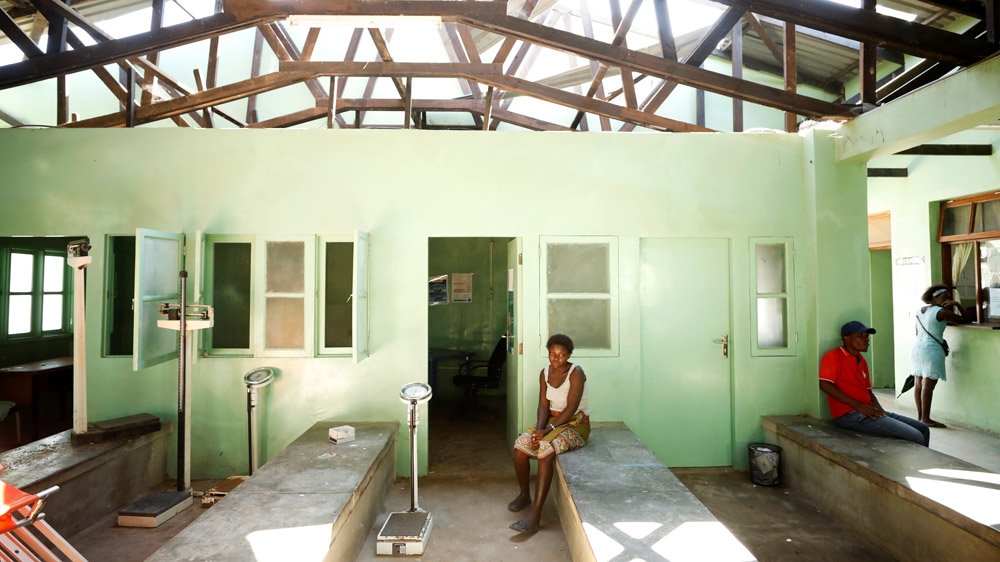‘Second disaster’: Fears of disease, hunger in Mozambique
Cyclone-ravaged Mozambique faces a “second disaster” from cholera and other diseases, officials have warned, as the United Nations launched an urgent aid appeal for an estimated 1.8 million people affected by storm winds and flash floods.
Speaking to reporters on Tuesday, Antonio Guterres, the UN secretary-general, described Cyclone Idai which slammed into Mozambique, Zimbabwe and Malawi on March 14 as “one of the worst weather-related catastrophes in the history of Africa”.
“We fear that whole villages have been washed away in places we have yet to reach,” he said, raising the spectre of hunger, saying the storm had inundated Mozambique’s breadbasket on the eve of harvest.
Mozambican authorities, cited by Portuguese news agency Lusa, put the death toll at 468. At least 259 died in Zimbabwe, while another 56 died in Malawi. Officials said these figures were “very preliminary” with more bodies expected to be found as floodwaters drain away.
More than 10 days after the storm’s deadly hit, emergency responders were racing to contain deadly diseases such as cholera, which officials said will break out as more than a quarter-million displaced people shelter in camps with little or no clear water and sanitation.
Many wells were contaminated by the floods.
‘There is no food’
Survivors living in tent camps, schools, churches, roads and other impromptu places said they have little but their clothes.
“At least I had a home before the cyclone, life was a little normal even though I didn’t have much,” Humberto Jose, a resident of the hard-hit city of Beira told Al Jazeera.
“But now I have lost everything, it’s not just me sleeping here, the streets are full of families with children,” he said.
 |
| Dozens of health centres have been damaged by the cyclone [Mike Hutchings/Reuters] |
Daviz Simango, mayor of the devastated city, told Al Jazeera “there is no food” in Beira.
“We need to work. We need to get to our farms, we need to rebuild ourselves,” he said.
In the small village of Bejaga, some 150 survivors were hungry.
In the past week relief workers have dropped off “just a cup of (vitamin-fortified) soya per family. It’s way too little,” said Francisco Lopez, a farmer.
“We are waiting,” he told AFP news agency.
He had salvaged a few maize cobs in the mud and he sifted through them grain by grain, looking for any edible morsel. He had dried the food on a tarpaulin, but much of it was rotten after nearly two weeks under water.
“We really have nothing to eat, we have received almost nothing in aid,” he said.
‘Long, long journey’
The World Health Organization (WHO) said it was expecting a “spike” in malaria cases in Mozambique as the disease-carrying mosquitoes breed in standing water.
No cholera cases have yet been confirmed, but health workers have reported an upsurge in cases of diarrhoea – a symptom of the disease.
WHO said 900,000 oral cholera vaccines were expected to arrive later this week.
“We must not let these people suffer a second disaster through a serious disease outbreak or inability to access essential health services. They have suffered enough,” Dr Djamila Cabral, the WHO Representative in Mozambique, told reporters in Geneva.
She said people in camps were living in “horrific conditions” and that about 55 health centres had been severely damaged.
The UN has appealed for $282m to help cyclone victims in Mozambique.
David Beasley, executive director of the World Food Programme (WFP), told Al Jazeera from Beira that it would take a long time for the region to recover.
“The cyclone has come and gone but the devastation is here to stay. We’re doing everything we can to get food into these villages, the problem is roads are gone, electricity is gone, there’s no clean water.
“So we have serious issues all throughout this region that has been devastated,” he said. “This is going to be a long, long journey.”
Beasley added that the WFP has deployed 150,000 people to help relief efforts and plan to scale up to 600,000 in the next five to six days and possibly 1.7 million over the next few months.
The agency has designated Mozambique a level-three emergency, placing it on par with Syria, Yemen and South Sudan.




